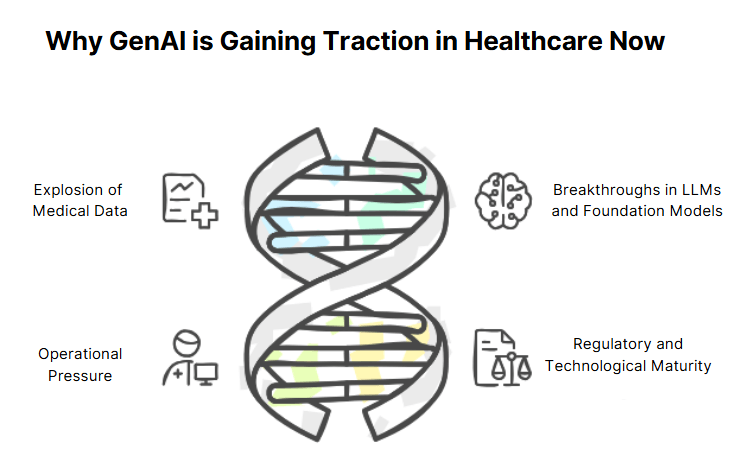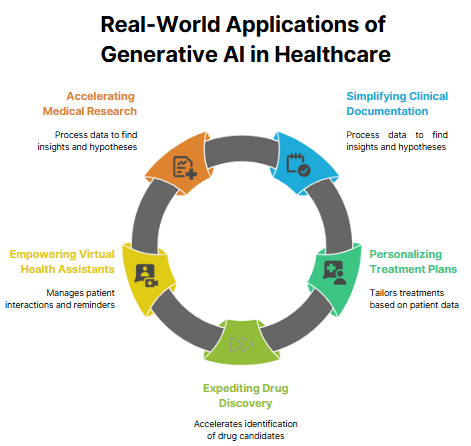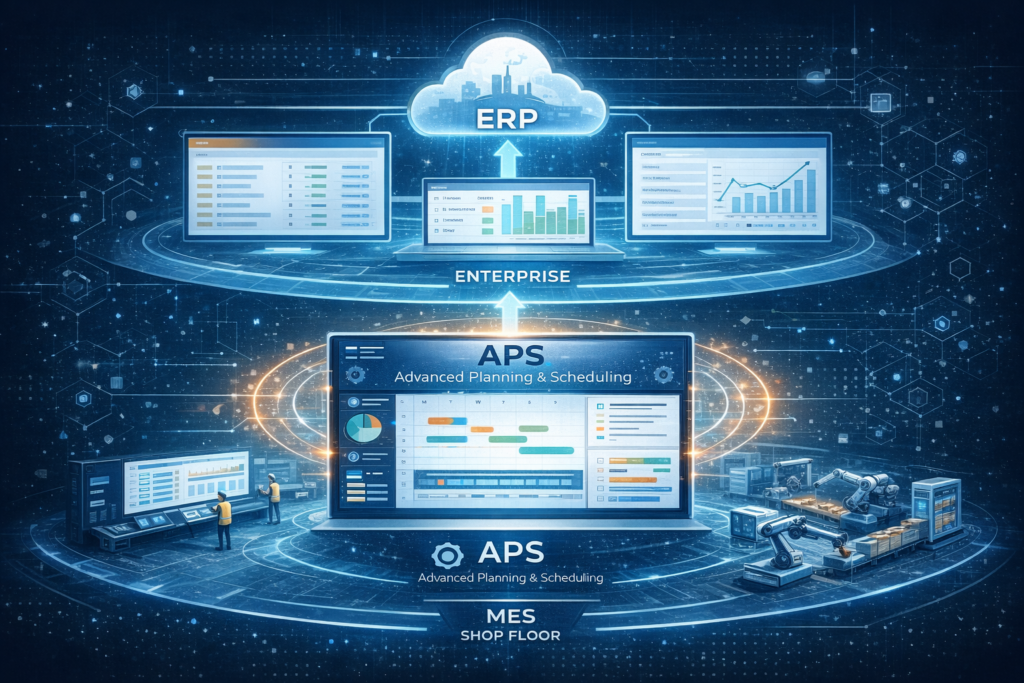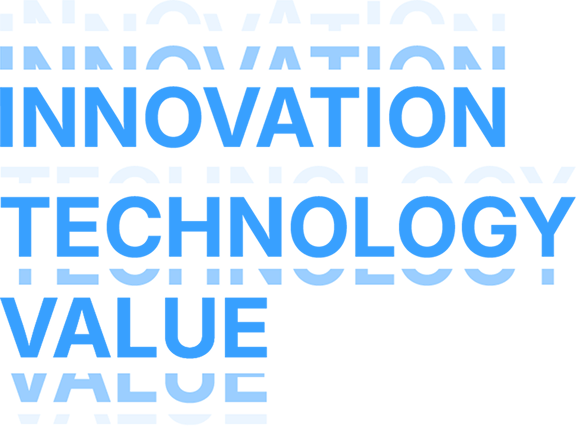Every era of medicine has been defined by its breakthrough tools. The stethoscope brought sound to diagnosis. The X-ray gave us eyes beneath the skin. The MRI unveiled the hidden architecture of the human body.
Now, Generative AI in healthcare is poised to redefine how we understand, diagnose, and treat diseases. It doesn’t just support decisions but generates possibilities. It can summarize thousands of patient records in seconds, create synthetic medical images for training and analysis, simulate the behavior of new drug compounds, and even help tailor treatment plans to individual genetic profiles.
In this blog, we’ll explore how Generative AI is reshaping the healthcare landscape, from clinical care to drug discovery, and why its true potential is only beginning to unfold.
What is Generative AI in Healthcare?
Generative AI in healthcare refers to the application of deep learning models, often large language models (LLMs) or diffusion models, to generate medically relevant content. This could include:
- Automatically writing clinical notes from doctor-patient conversations
- Creating synthetic medical images for training or data augmentation
- Generating molecular structures for drug discovery
- Assisting in patient communication through chatbots or virtual health assistants
- Summarizing long, complex research into digestible insights for clinicians
Unlike traditional AI models that simply classify or detect patterns, GenAI creates them. That’s its core distinction and biggest advantage.
Why GenAI is Gaining Traction in Healthcare Now
Several powerful shifts are converging, making this the ideal time for Generative AI in healthcare to accelerate. These changes, both in technology and healthcare delivery, are creating a fertile ground for Generative AI to revolutionize how medical professionals deliver care, make decisions, and improve outcomes.

Explosion of Medical Data
Hospitals, research centers, wearables, and health apps are generating an immense volume of unstructured medical data every day. Clinical notes, imaging, sensor data, and Electronic Health Records (EHR) logs all of which remain largely underutilized. Generative AI in healthcare thrives on such data, especially when paired with large language models (LLMs) fine-tuned for medical tasks.
These AI models can sift through vast amounts of information in seconds, extracting critical insights and providing actionable recommendations. By leveraging these unstructured data sets, Generative AI helps unlock the full potential of healthcare information, making it a vital asset in clinical decision-making.
Breakthroughs in LLMs and Foundation Models
The development of large language models (LLMs) like GPT-4, Med-PaLM 2, and BioBERT is propelling Generative AI forward in healthcare. These models are increasingly trained on specialized biomedical corpora, giving them the ability to understand the unique context of medical language, including nuanced clinical terms and patient records.
Generative AI in healthcare is now capable of producing high-quality summaries, assisting in diagnosis, recommending treatments, and even suggesting preventive measures. As these models continue to improve, their accuracy and reliability in clinical settings are becoming essential tools for healthcare providers seeking to make data-driven decisions.
Operational Pressure in Healthcare Systems
Healthcare systems worldwide are under extreme operational pressure. From staff shortages to clinician burnout and overwhelming administrative burdens, the need for tools that enhance productivity has never been more urgent. Generative AI in healthcare provides solutions that support healthcare professionals rather than replace them.
AI-driven systems can take over repetitive tasks such as documenting clinical notes, managing schedules, or even triaging patient data. By offloading these cognitive and time-consuming responsibilities, Generative AI empowers clinicians to focus on patient care, improving both efficiency and overall healthcare delivery. This is not about replacing human expertise but enhancing it with smart, reliable tools.
Regulatory and Technological Maturity
Regulatory frameworks and cloud infrastructure are also catching up with the need for AI in healthcare. Governments, particularly in the EU, are introducing clearer standards for AI deployment, like the EU AI Act, ensuring AI technologies meet safety and ethical standards.
At the same time, cloud service providers are offering HIPAA-compliant infrastructure, making it easier for healthcare organizations to adopt Generative AI without compromising patient privacy. With this combination of clearer regulations and secure infrastructure, the path to adopting Generative AI in healthcare is not only feasible but is increasingly streamlined and reliable.
Real-World Applications of Generative AI in Healthcare
Generative AI is revolutionizing the healthcare landscape by addressing longstanding challenges with powerful, practical solutions. Whether it’s enhancing patient care, expediting research, or improving operational efficiency, the technology is creating profound, measurable changes across the healthcare ecosystem.

Simplifying Clinical Documentation
Administrative work continues to weigh heavily on healthcare professionals, with studies showing that clinicians spend up to 33% of their time on documentation tasks (Bain & Company, 2021). Generative AI is transforming this process by automatically drafting clinical notes, summarizing patient encounters, and updating Electronic Health Records (EHRs) in real time. These AI-powered systems can interpret unstructured data, extract relevant information, and convert it into accurate, structured records within seconds.
- Key Benefit: This automation not only enhances efficiency but also reduces human error and documentation inconsistencies, which is critical for patient safety and care quality.
- Real-World Impact: Studies show that AI-assisted clinical documentation can reduce documentation time by up to 50% (JAMA Network, 2020).
Personalizing Treatment Plans
Personalized medicine is transforming how healthcare providers approach treatment decisions. Generative AI plays a crucial role in this shift by analyzing complex datasets, including genetic profiles, medical histories, and real-time health metrics, to suggest tailored treatment options for individual patients. This data-driven strategy helps identify therapies most likely to be effective while minimizing potential side effects.
- Key Benefit: AI systems synthesize diverse data points to predict how patients will respond to different treatments, ensuring care plans align closely with each person’s unique clinical profile.
- Real-World Impact: A study by Harvard Medical School demonstrated that AI-powered treatment recommendations improved survival rates for certain cancer patients.
Expediting Drug Discovery
The conventional drug discovery process is lengthy and expensive, often taking 10–15 years and costing upwards of $2.6 billion per drug (Tufts Center for the Study of Drug Development). Generative AI is changing that by accelerating the identification of promising drug candidates. Through deep learning models, AI simulates molecular structures, predicts their potential biological activity, and helps researchers focus on the most promising leads, drastically cutting down the timeline and cost of drug development.
- Key Benefit: AI speeds up the entire drug discovery pipeline, ensuring that vital medications reach the market faster and at a lower cost.
- Real-World Impact: For instance, in 2020, AI played a crucial role in developing a preclinical drug candidate for fibrosis within 46 days, compared to the months or even years required in traditional methods (Insilico Medicine, 2020).
Empowering Virtual Health Assistants
Generative AI is transforming patient engagement through intelligent virtual health assistants. These AI-powered systems manage routine interactions like appointment bookings, medication reminders, and responding to health queries using natural, conversational language. More importantly, they maintain continuous, accessible communication with patients, extending care beyond the hospital or clinic.
- Key Benefit: AI-driven virtual assistants ease administrative workloads while improving patient satisfaction and adherence to treatment plans.
- Real-World Impact: Several healthcare systems have successfully deployed AI virtual assistants to support chronic disease management and mental health triage, reporting improved patient response rates and reduced administrative bottlenecks in outpatient services.
Accelerating Medical Research
The volume of medical data and published research is growing at an unprecedented pace, making it increasingly difficult for scientists to keep up. Generative AI is changing this by processing large collections of clinical studies, extracting meaningful insights, and even proposing new research hypotheses. These systems can sift through thousands of papers, identify relevant trends, and highlight potential biomarkers or therapeutic targets, tasks that would take human researchers months to accomplish.
- Key Benefit: AI streamlines the research process by rapidly synthesizing existing evidence and revealing hidden patterns, enabling researchers to focus on the most promising directions.
- Real-World Impact: In fields like oncology and neurology, AI tools have already accelerated the discovery of novel biomarkers and supported the design of more efficient clinical trials, contributing to faster, data-driven breakthroughs
The Future of Generative AI in Healthcare
Generative AI is evolving beyond supportive tools into indispensable clinical partners, and several transformative directions are already taking shape:
Multimodal GenAI: From Data Silos to Complete Patient Stories
Tomorrow’s AI systems won’t be limited to just text or images. Multimodal models will simultaneously interpret clinical notes, lab results, diagnostic images, sensor data, and even voice recordings to provide a richer, context-aware understanding of each patient’s condition. This integrated view could help spot subtle patterns across different data sources, leading to earlier and more accurate diagnoses.
AI That Stays Close to the Bedside: On-Device GenAI
With privacy concerns at an all-time high, healthcare is moving toward AI models that process sensitive data locally, on hospital servers, mobile health devices, or clinician tablets. These edge AI solutions reduce latency, protect patient privacy, and enable offline decision support, especially valuable in remote care or emergency settings where connectivity is unreliable.
Privacy-Safe Collaboration Through Federated Learning
AI thrives on data, but healthcare data can’t freely cross institutional or national borders. Federated learning allows hospitals and research centers to collectively train AI models without ever sharing raw patient data. Each institution retains control of its datasets while contributing to a stronger, shared AI model. This technique enhances model accuracy while ensuring strict compliance with data protection laws.
Clinical-Grade LLMs: Smarter, Safer, and Evidence-Based
The next generation of language models for healthcare won’t be trained on general web text. Instead, they’ll learn from peer-reviewed journals, clinical guidelines, and anonymized patient records, providing answers and recommendations rooted in verified medical science. These models promise to minimize AI hallucinations and deliver trustworthy clinical insights that align with real-world standards.
Purpose-Built AI Assistants for Medical Specialties
Generic AI tools are giving way to highly specialized digital assistants tailored for individual medical fields. Radiology AI will master image-based anomaly detection, dermatology AI will interpret skin lesion images, and oncology AI will assist in tumor profiling and treatment selection. Focused training on specialty-specific datasets ensures these AI agents can handle the complexities of their domain with precision.
Read more: Top 6 GenAI Trends in Healthcare in 2025
Conclusion
The promise of Generative AI in healthcare isn’t about generic solutions or one-size-fits-all tools. Every health system, every patient population, every clinical workflow has its own complexities. That’s why the real value lies in building AI that’s not only intelligent but deeply contextual, clinically validated, and operationally reliable.
If you’re looking to move beyond off-the-shelf AI and build something truly transformative, VTI is ready to partner with you.
![[FREE EBOOK] Strategic Vietnam IT Outsourcing: Optimizing Cost and Workforce Efficiency](https://vti.com.vn/wp-content/uploads/2023/08/cover-mockup_ebook-it-outsourcing-20230331111004-ynxdn-1.png)






